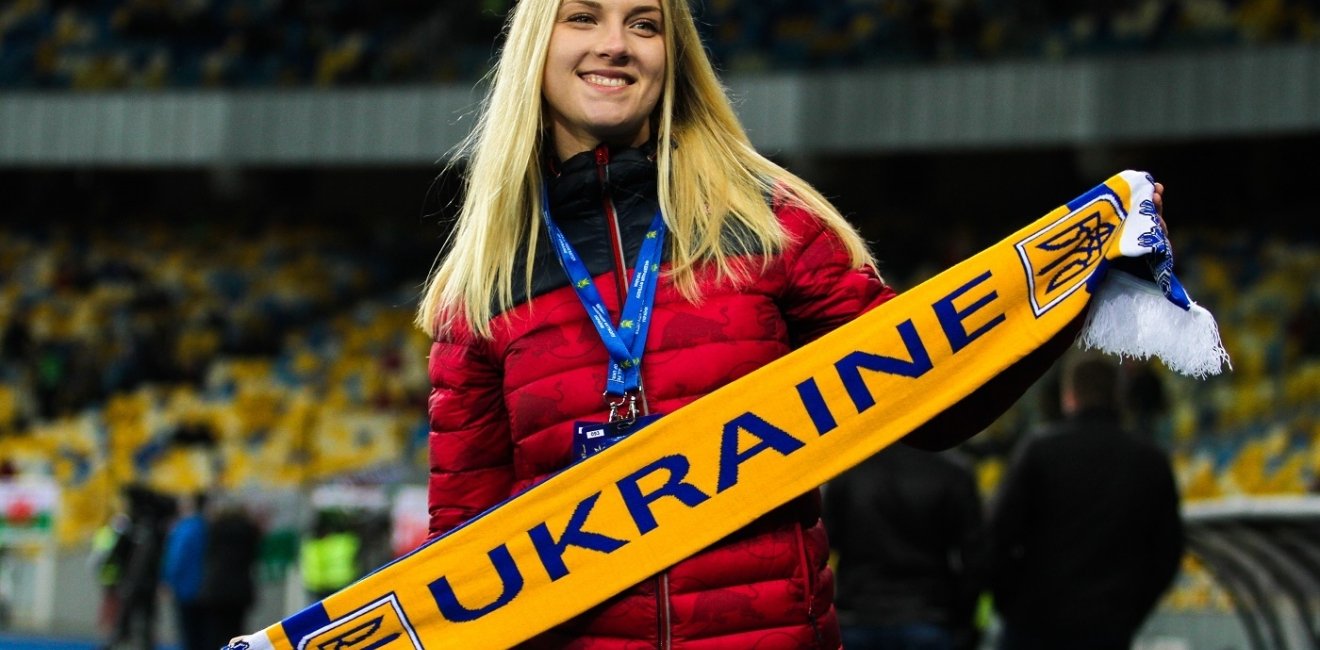The Cultural Diplomacy of Excluding Russians from Public Spaces
Given Russia's full-scale invasion of Ukraine, what is the Ukrainian cultural response, and why do Ukrainians often refuse to speak on the same stage with Russians?

A blog of the Kennan Institute
Given Russia's full-scale invasion of Ukraine, what is the Ukrainian cultural response, and why do Ukrainians often refuse to speak on the same stage with Russians?

During the Fencing World Championships in Milan at the end of July, Ukrainian fencer Olha Kharlan refused to shake hands with her Russian rival, Anna Smirnova, and almost paid for it with her career. According to the rules of the International Fencing Federation, a handshake after the bout is a mandatory procedure, and the Russian demanded that the judges disqualify the Ukrainian for noncompliance with the rules. Kharlan was disqualified, on these grounds. Still, the International Olympic Committee, "taking into account the unique situation” of the invasion of her country, is allowing her to compete at the Olympic Games to be held in 2024 in Paris. Following the IOC decision, the International Fencing Federation canceled its decision on disqualification.
Can Dissident Russians Share the Stage with Ukrainians?
Kharlan's case was unusual not only for the world sports community but also for Ukraine, because she did not initially refuse to compete with the Russian. Since the beginning of Russia's full-scale invasion of Ukraine, Ukrainians have regularly refused to show up with Russians at the same events and have made it a condition of their participation that Russians do not participate, even those who openly oppose the war.
This May, a scandal broke out in New York when Ukrainian participants in the Voice of Peace literary festival set a condition for the organizer, PEN America: they would not speak at an event that also featured writers from Russia. Two roundtables were to be held during that festival, one with Ukrainian writers who serve in the Ukrainian Armed Forces, the other with Russian writers who have fled their authoritarian country. PEN America canceled the latter event to avoid conflict with the Ukrainian participants, and as a result, Masha Gessen, vice president of PEN's board of trustees and the writer (who uses gender-neutral pronouns) who was supposed to moderate the discussion with the Russians, left their post because they disagreed with the organization's decision. In their statement, Gessen said they were outraged by the actions of the organizers, but at the same time they shared and understood the demands of the Ukrainian participants, as "they are waging war to defend their country by all means available to them."
Who Sets the Policy?
The Ukrainian writers at the Voice of Peace festival referred to a state policy that prohibits them from appearing on the same stage with Russians, even though there is no such law or any official prohibition. A recent interview in the Ukrainian publication Zaborona with the director of the Ukrainian Institute, Volodymyr Sheiko, clarified where this position comes from. "We, the Ukrainian Institute, and I, personally, are in favor of nonparticipation of Ukrainians in joint events with Russians—this is our institutional position," Sheiko said.
The Ukrainian Institute is a state body that was established in 2017 under the Ukrainian Ministry of Foreign Affairs to develop cultural diplomacy and represent the country abroad, following the example of the Polish and French Institutes. Since then, the Ukrainian Institute has opened offices in Germany and England. The Ukrainian Institute represents the official position of the state in the international arena, so any organizations that cooperate with it accept the rules it has adopted.
"Since the first days of the invasion, the Ukrainian Institute has consistently made public appeals to Ukrainians and foreigners to exclude the Russian presence from international cultural events,” explains Sheiko, asking others “not to invite Russians…to join events with Ukrainians." He says, “we believe that any cultural presence of Russia in the world legitimizes its aggression against Ukraine, [and] justifies and normalizes the war. This argument is often misunderstood by our foreign interlocutors, especially those professing left-liberal views. The war is not the spawn of Putin or a few decision-makers. The war is the creation of Russian society and history, imperial ambitions, colonial, aggressive, and xenophobic attitudes, which are present, in particular, in classical and contemporary Russian literature, cinema, music, theater, etc."
Does Every Ukrainian Embody State Policy?
In Ukraine, people in cultural institutions and in media and civil society organizations often say that any Ukrainian speaking at a public event anywhere outside the country is a "representative of Ukraine." This view was recently expressed by Olha Aivazovska, head of the board of OPORA, an election monitoring organization, and one of Ukraine's important voices. "Every Ukrainian citizen with a Ukrainian passport is an agent of Ukraine's influence wherever he or she is," she said at the presentation of a study on Ukrainian refugees' activity abroad.
By this logic, Ukrainians' performances are evaluated in terms of state policies. If you step outside the official line—by, say, going on the same stage as a Russian—it can ignite internal conflict.
Since the beginning of the invasion, many major cultural institutions around the world have, on their own initiative, begun to exclude Russian artists and intellectuals from their programs. Most immediately affected by the ban were official cultural figures, those who supported the war, and those who did not openly express their opinion about the invasion. Ukrainian cultural figures and organizations began to ask various institutions not to include Ukrainians and Russians in their programs at the same time and not to create situations in which "two warring peoples" were expected to attempt a reconciliation through artificially created dialogue.
Nevertheless, some Ukrainians have performed and continue to perform on the same stage with Russians. For example, in September 2022, Yuriy Andrukhovych, one of the most famous Ukrainian writers, shared a stage with the Russian writer Mikhail Shishkin at the Bjørnsonfestivalen in Norway. Shishkin openly opposes the invasion and has long lived abroad. A dialogue took place between them that helped the audience understand their individual positions. Hundreds of cultural figures spoke out against Andrukhovych's decision to be there, arguing that it is not proper for a Ukrainian to share the same stage with a Russian, even if the latter is openly anti-Putin.
Is this a Ukrainian Version of “Cancel Culture”?
Some have referred to the phenomenon of Ukrainians demanding that Russians be excluded from high-profile public platforms as a Ukrainian version of cancel culture—a phenomenon which arose in the United States in the late 2010s and refers to a trend to publicly shame and ostracize individuals deemed to have acted or spoken against a presumed set of rules. Cancel culture could, in some ways, be described in terms of power imbalances. Lacking effective levers to exact justice in the judicial or administrative systems, some have used the tools of cancel culture to ensure that perpetrators of injustices get their comeuppance. Many, however, argue that cancel culture is fundamentally illiberal, going against the principles of a presumption of innocence and depriving the accused of the right to present their case in the court of public opinion.
Given the context of Russia’s all-out war against Ukraine, however, this is too simplistic a perspective, as Sheiko, the director of the Ukrainian Institute, noted in his Zaborona interview. The real rationale behind the drive to exclude Russians from public events is that Ukrainian voices have never been heard as loudly on the international stage as Russian voices have. Ukrainian culture was suppressed for centuries by the Russian Empire and the Soviet Union, and now Russia is physically destroying Ukrainians precisely because they are Ukrainians who want to live independently of their eastern neighbor.
In addition—and perhaps most important—Ukraine is heavily dependent on its foreign partners for arms and defense. This makes it radically different from Russia, which has what seems like an endless supply of weapons with which to shell peaceful Ukrainian cities every day. Ukrainians have to beg the West for fighter jets, tanks, and air defense systems. It takes a lot of time and effort, and even more time and effort to get these weapons on the ground. That is why every speech by a Ukrainian in the international arena is perceived as a cry for help.
The problem with many Russian figures who openly oppose Putin and the war is that they do not use their platforms for the same objectives as Ukrainians. There are multiple examples of anti-war Russian journalists, artists, and politicians declining to collect funds for Ukrainian military purposes.
For Ukrainians, then, sharing the stage with Russians means letting the invader take their voices, while the lives of millions of people in the country against which Russia has unleashed an unjust war, literally depend on the public presence of Ukrainians. That is why it is not easy, and often impossible, for Ukrainians to shake hands with Russians in front of the world.
The opinions expressed in this article are those solely of the author and do not reflect the views of the Kennan Institute.


After more than 50 years as a vital part of the Wilson Center legacy, the Kennan Institute has become an independent think tank. You can find the current website for the Kennan Institute at kennaninstitute.org. Please look for future announcements about partnership activities between the Wilson Center and the Kennan Institute at Wilson Center Press Room. The Kennan Institute is the premier US center for advanced research on Eurasia and the oldest and largest regional program at the Woodrow Wilson International Center for Scholars. The Kennan Institute is committed to improving American understanding of Russia, Ukraine, Central Asia, the South Caucasus, and the surrounding region through research and exchange. Read more



